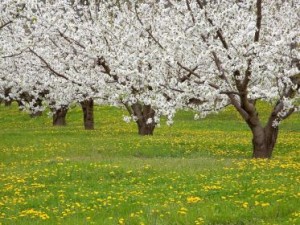 In today’s Gospel reading for Mass, Jesus reminds us, “A good tree does not bear rotten fruit, nor does a rotten tree bear good fruit. For every tree is known by its own fruit. For people do not pick figs from thornbushes, nor do they gather grapes from brambles. A good person out of the store of goodness in his heart produces good,but an evil person out of a store of evil produces evil; for from the fullness of the heart the mouth speaks” (Luke 6:43-45). When I was still on the journey home to the Catholic Church, but was still in Protestant ministry, I had an interesting encounter with a Catholic priest. At the time I was exploring Catholic doctrines, things I should have learned well while growing up Catholic, but didn’t. I was enthralled by what I was discovering, even becoming convinced of the truth of the Catholic position, but at the time I didn’t think it was necessary for me to revert. I thought I could remain in a Protestant context, and teach those who listened to my preaching about Catholicism, sharing its riches, without having to necessarily be visibly, corporately united to the Catholic Church. My conversation with this priest (whose name, sadly, I don’t recall) was one of the things that convinced me otherwise.
In today’s Gospel reading for Mass, Jesus reminds us, “A good tree does not bear rotten fruit, nor does a rotten tree bear good fruit. For every tree is known by its own fruit. For people do not pick figs from thornbushes, nor do they gather grapes from brambles. A good person out of the store of goodness in his heart produces good,but an evil person out of a store of evil produces evil; for from the fullness of the heart the mouth speaks” (Luke 6:43-45). When I was still on the journey home to the Catholic Church, but was still in Protestant ministry, I had an interesting encounter with a Catholic priest. At the time I was exploring Catholic doctrines, things I should have learned well while growing up Catholic, but didn’t. I was enthralled by what I was discovering, even becoming convinced of the truth of the Catholic position, but at the time I didn’t think it was necessary for me to revert. I thought I could remain in a Protestant context, and teach those who listened to my preaching about Catholicism, sharing its riches, without having to necessarily be visibly, corporately united to the Catholic Church. My conversation with this priest (whose name, sadly, I don’t recall) was one of the things that convinced me otherwise.
I had explained to the priest all of the things I just mentioned above, and he had patiently listened. In response he simply said, “You can’t give what you don’t have”.
I eventually realized he was right. I couldn’t share the wealth of the doctrines of Catholicsim, “the unsearchable riches of Christ”, as St Paul puts it, if I didn’t posess them myself. I had to try and live them, not just talk about them. And this is another reason why Jesus’ words in today’s Gospel matter so much.
If we hope to share our faith with others (and all of us are called to holiness and apostolate via our baptism), we can’t be operating out of our spiritual reserves. Our spiritual tanks must be full. We have to give out of our abundance, not our lack. The caregiver must be cared for as well. This is why we must allow Christ to minister to us, by spending time with him at Holy Mass and in personal prayer, allowing him to speak to us in our scriptural and spiritual reading, and letting him feed us with his very Body and Blood in the Eucharist. We must let him cleanse us regularly in the confessional, washing away the grime of life’s journey that can stick to our souls. Then, God can produce the produce of the Kingdom in our lives, luscious fruit that our companions on the journey can draw from, many of whom are spiritually starving.
And we can look to Mary, exemplar of the fruitful Christian life, to help us. No life bore more for Kingdom purposes, for “the fruit of her womb” (Luke 1:42) is none other than the King of that Kingdom, Christ himself.


Leave a Reply
Want to join the discussion?Feel free to contribute!